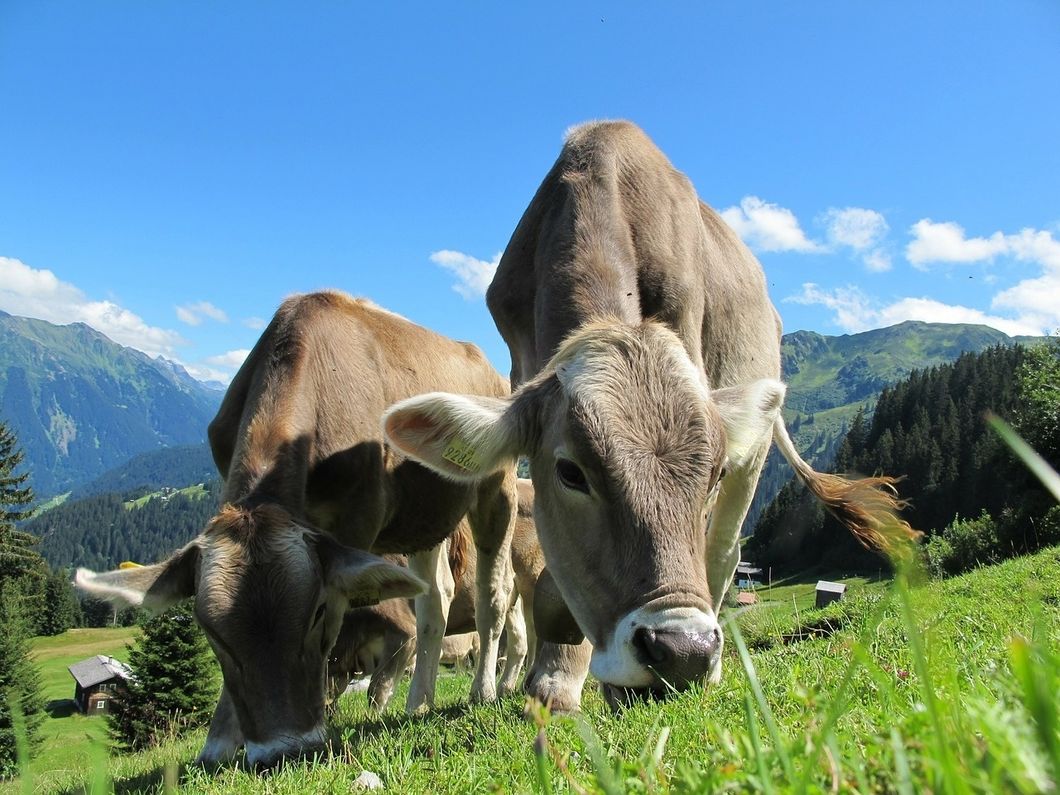Hamburgers, steak, pepperoni, bacon, they sure are some of the tastiest meat delicacies we have ever eaten. However, they are some of the most environmentally damaging meat products. This article is not meant to shame people who consume meat, but it is meant to call attention to the fact that what you are eating, does affect the environment. Eating a juicy burger from In-N-Out or a steak from Morton's Steakhouse, and then eating bacon on the side of your eggs for breakfast every other day, takes a serious toll on the environment.
The environmental effects that occur because of our meat consumption includes deforestation, loss of precious water and soil, and release of harmful chemicals and pesticides into our water from the production to distribution process, as well as green house gasses being emitted into our atmosphere. According to the Union of Concerned Scientists, meat-eating is the second-biggest environmental hazard facing the Earth, right after number one being fossil-fuel vehicles.
Environmental impacts our meat eating habit includes, drying up our freshwater reservoirs and aquifers, degradation of use of soil, deforestation which is directly related to the amount of cropland used for growing the animals as well as the food for them to consume, water pollution due to pesticides, fertilizers, and animal waste, and high emission of greenhouse gases.
Eating too much meat has consequences for our bodies as well, and can lead to increasing rates of heart disease, obesity, and cancer. As the world population continues to increase, more people means more meat. According to researchers, meat production will double by 2050 to about 1.2 trillion pounds a year, which will cause detrimental effects on the environment and people's health.
The choices we make as individuals are incredibly important, especially when we are living in a generation where environmental issues are effecting our planet. Avoiding or at least limiting meat products in your diet, is one of the single biggest ways to reduce your ecological footprint on the planet. It is important to be conscientious of what we consume, for it has everlasting harmful impacts, on our precious, fragile planet.



 Photo by
Photo by  person holding black smartphone on white textile
Photo by
person holding black smartphone on white textile
Photo by  StableDiffusion
StableDiffusion
 Photo by
Photo by  Photo by
Photo by 
 roommate as a therapist
StableDiffusion
roommate as a therapist
StableDiffusion
 woman in white shirt eating pizza
Photo by
woman in white shirt eating pizza
Photo by  person holding remote pointing at TV
Photo by
person holding remote pointing at TV
Photo by  person holding assorted clothes in wooden hanger
Photo by
person holding assorted clothes in wooden hanger
Photo by  a couple of
a couple of  friends cleaning apartment
StableDiffusion
friends cleaning apartment
StableDiffusion
 man driving car during golden hour
Photo by
man driving car during golden hour
Photo by  bacon strips and melted cheese topped fries on oval white and blue platter with gray stainless steel forks
Photo by
bacon strips and melted cheese topped fries on oval white and blue platter with gray stainless steel forks
Photo by  selective focus photography of eyeshadow palette
Photo by
selective focus photography of eyeshadow palette
Photo by  brown wooden framed white padded chair in between green indoor leaf plants inside bedroom
Photo by
brown wooden framed white padded chair in between green indoor leaf plants inside bedroom
Photo by  women forming
women forming  taking
taking  man in red polo shirt pouring wine on clear wine glass
Photo by
man in red polo shirt pouring wine on clear wine glass
Photo by  woman in black jacket standing on road during daytime
Photo by
woman in black jacket standing on road during daytime
Photo by 
 StableDiffusion
StableDiffusion
 StableDiffusion
StableDiffusion
 student thinking i shouldnt have procrastinated all semester
StableDiffusion
student thinking i shouldnt have procrastinated all semester
StableDiffusion
 Photo by
Photo by  Photo by
Photo by  Photo by
Photo by  StableDiffusion
StableDiffusion
 StableDiffusion
StableDiffusion
 Photo by
Photo by  Photo by
Photo by 


 Lumiere figure at the Disney Store at the Ala Moana Shoppi… | Flickr
Lumiere figure at the Disney Store at the Ala Moana Shoppi… | Flickr








 StableDiffusion
StableDiffusion StableDiffusion
StableDiffusion 10. Extra BlanketsJuwenin Home 100% Cotton Knitted Throw Blanket
10. Extra BlanketsJuwenin Home 100% Cotton Knitted Throw Blanket StableDiffusion
StableDiffusion StableDiffusion
StableDiffusion File:Kishlaru familie.jpg - Wikimedia Commons
File:Kishlaru familie.jpg - Wikimedia Commons Photo by Hanna Balan on Unsplash
Photo by Hanna Balan on Unsplash StableDiffusion
StableDiffusion black blue and yellow round illustrationPhoto by
black blue and yellow round illustrationPhoto by 









